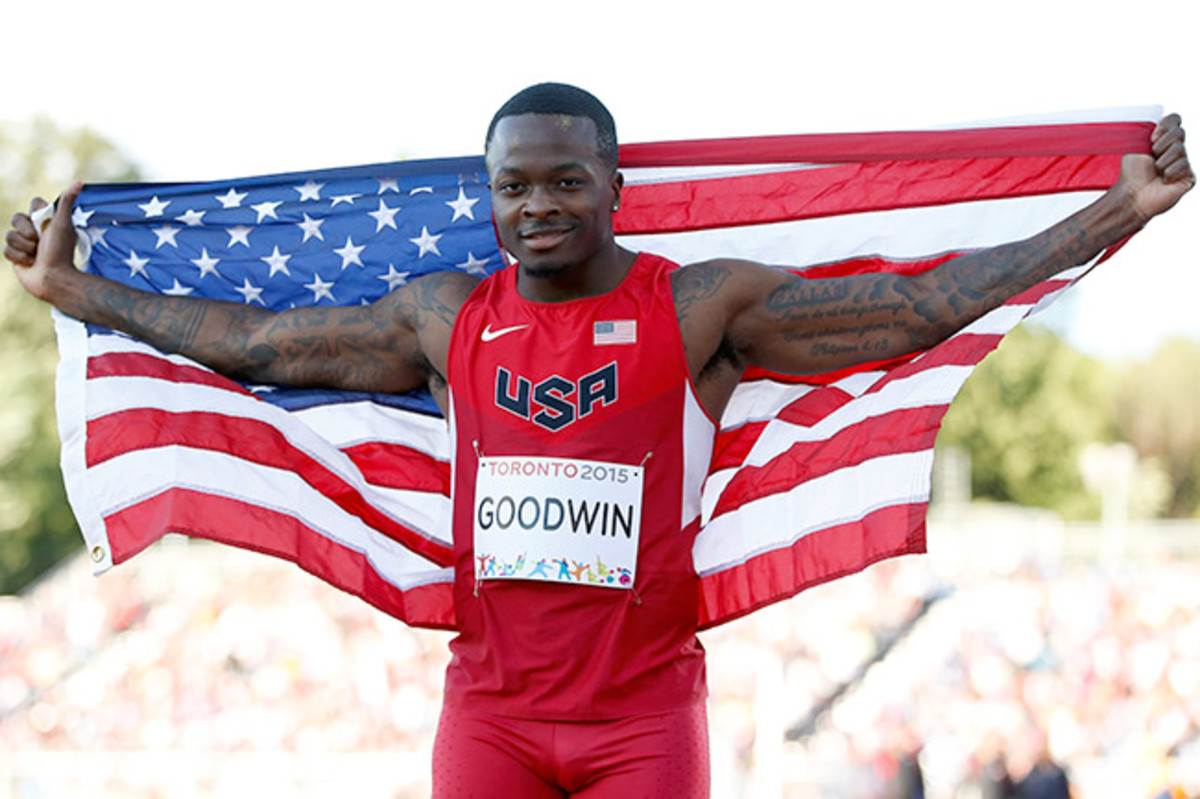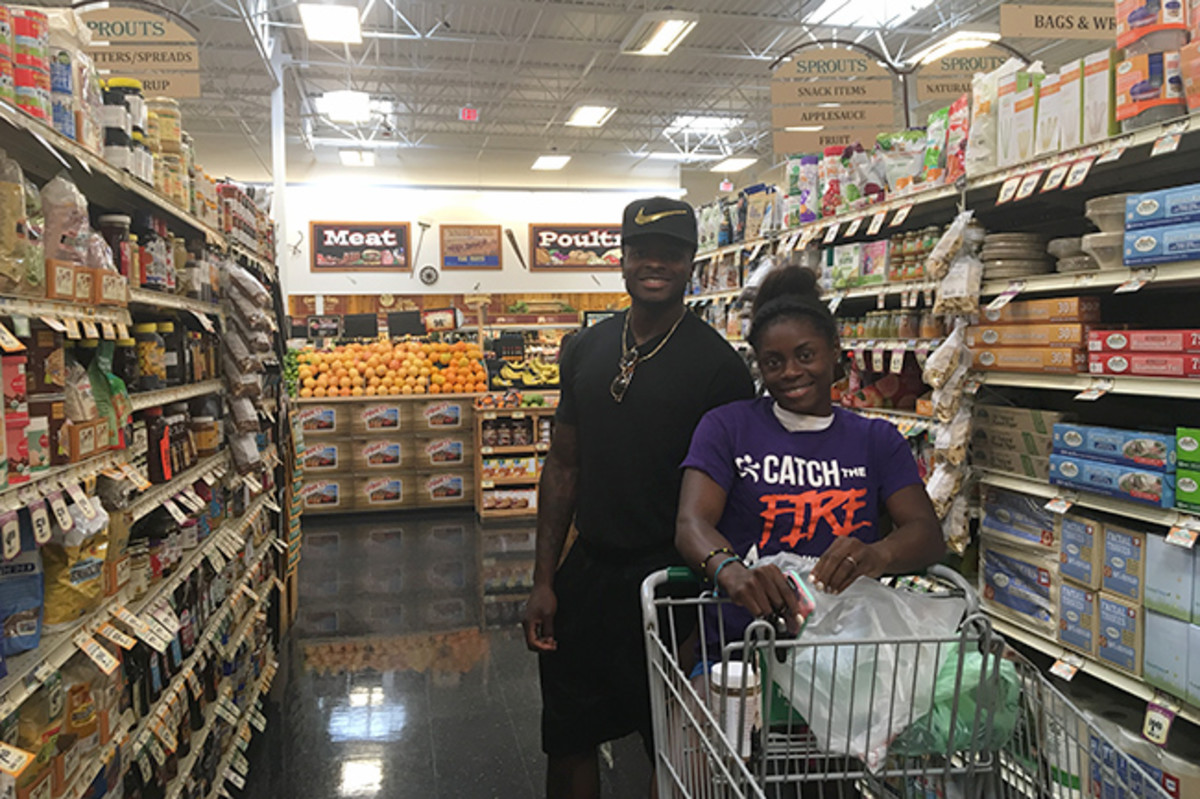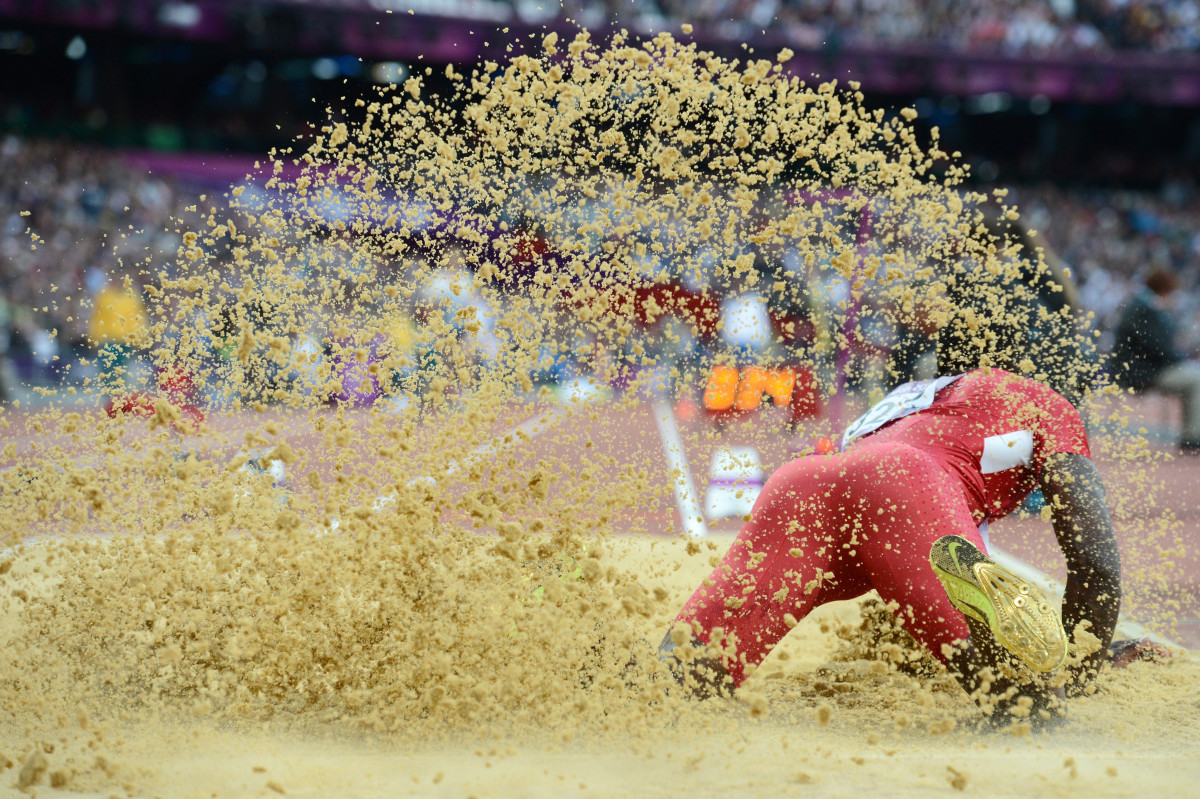Marquise Goodwin Is Making the Jump

DALLAS — Marquise Goodwin is straddling the line between his NFL career and his Olympic dream. And on a recent Thursday evening, he has an epiphany.
“I got it!” he exclaims. “We’re going to make vegan cheesecake!”
Buried in the dairy aisle, the Bills wide receiver keeps scrolling through his phone. Grocery shopping with his wife has taken a five-minute pause as Goodwin puts himself in charge of picking a dessert.
At this time of year, Goodwin is usually consuming 2,000-calorie dinners: double orders of fried rice, chicken and salmon at the Bills’ regular hibachi dinners. Now, he’s considerably slimmed down his diet. For dinner, vegan nachos (yes, potatoes and veggie “cheese”) will include a tasty finish: as long as it’s simple.
Goodwin scans the recipe as Morgan waits patiently. It’s only seven ingredients, he tells her, “and don’t worry, it all looks organic.”
“The only thing I need to know,” he says, “Is where are the pitted dates?”
During the lull before jetting to Eugene, Oregon for the U.S. Olympic trials, then Houston for Olympic training camp, then Rio de Janeiro for the Olympic Games, then Rochester, New York for Bills training camp—a whirl of 44 days—Goodwin has slipped into a routine. He and his wife, Morgan (a hopeful in the 100-meter hurdles), spend days at the Michael Johnson Training Center in McKinney, Texas some 50 miles from their Dallas home, then stop at Sprout Organic Grocery store on the commute back. Marquise prepares dinner; Morgan is sous-chef.
Organic cooking is a new obsession for the 25-year-old. Goodwin needed to slim into track shape, and find an outlet for months of mental solitude. The last time he juggled football and track was the lead up to the 2012 Games. A rising senior at the University of Texas, he was excused from Longhorns football practices in order to compete in the London Olympics, where he was a gold-medal favorite in the long jump. At the Games, he tied for the longest jump of the qualifying round. In the finals, he scratched his first jump. After overcompensating for the wind, he jumped too early on his second attempt. After a disappointing third try, he was out of medal contention. Goodwin burrowed his face into the sand, then buried his face into his hands. He finished 10th. “The world saw him cry,” says Morgan, then his girlfriend.
Four years later, with an NFL career on hold, he is ready to jump again.
* * *

Nearly three dozen Olympians have attempted careers in the NFL; few have succeeded in reverse. Herschel Walker was the last man with NFL experience to compete at an Olympics. At the 1992 Albertville Winter Games, Walker’s two-man bobsleigh team placed seventh. He had played six NFL seasons at that point, and he’d return to play six more.
Including Goodwin, there could be as many as five current or former NFL players competing in Rio this summer. Like Goodwin, former Patriots and Bucs return specialist Jeff Demps is looking to compete in his second Olympics. (Demps earned a silver medal after running a preliminary heat for the U.S. 4 x 100 relay team in London, but it was stripped after teammate Tyson Gay was caught doping.) One-time Lions feature back Jahvid Best is hoping to represent St. Lucia, a Caribbean island that is his father’s home country, in the 100 meters. Patriots safety Nate Ebner is trying to make the U.S. rugby team, while former 49ers running back Jarryd Hayne gave up football this offseason to compete in his original sport (rugby) for his native country (Fiji).
Of them, Goodwin shoulders the most scrutiny because of what he might be giving up. The Bills, having lost Percy Harvin to retirement and Chris Hogan to the Patriots this offseason, are thin at wide receiver. If he makes the U.S. team, Goodwin will miss most of training camp, putting his roster spot in jeopardy. Beset by injuries, he has played in only 24 games over three seasons; 17 of his 20 career receptions and all three of his TD catches came during his rookie year.
“I know it is a risk,” Goodwin says. “I want a second contract. I’d love it to be in Buffalo. I love football. But I know how important it is to live your life like you want to. I know some organizations wouldn’t allow that, but Rex [Ryan] does and I’m so appreciative of that.”
At the combine in 2013, every team tried to figure out if Goodwin was still interested in track. Some teams, he said, weren’t exactly opposed—“maybe they thought it would be good marketing,” Goodwin surmises—the 49ers, Cowboys and Seahawks among them. Most teams wanted to hear the answer Goodwin himself believed at the time: I am 100 percent committed to being a professional football player.
As Goodwin told teammates when he walked off the track in London four years ago: “That was my last jump ever.”
“And I meant it,” he says now. But last summer, he began wondering if he still had it in him. In May, without telling Bills teammates or coaches, he began to train. “I was scared the team was going to shut it down,” Goodwin says, “or they would make me not want to do it by dogging me out in practice and making me dead tired.” When mini-camp ended in June, he flew to Eugene for the U.S. outdoor championships (where Morgan was competing, anyway). Goodwin jumped 27, 5 1/2 inches—his personal best, despite not jumping in three years. Four weeks later, at the Pan American Games in Toronto, he could no longer keep it a secret.
According to Goodwin, Ryan encouraged him to keep jumping. “The way Rex sees it,” Goodwin says, “is that you’re a man at the end of the day. He said, ‘I wouldn’t want to take you from a dream of yours. And if that’s a dream of yours, go do it.’”
Bills wide receivers coach Sanjay Lal was among those cheering on Goodwin at the Pan Am Games, where Goodwin took silver. This year, he holds the two longest competitive jumps in the world. “I wouldn’t be doing this if I wasn’t jumping at this level,” he says. When he asked Ryan for the summer off, the coach didn’t hesitate. “There’s no way I was going to have this young man miss that opportunity because, oh yeah, he has to be here at OTAs,” Ryan says.
* * *

After the disappointing finish in 2012, Goodwin asked the United States Olympic Committee if he could depart London early. He was on a flight the next day. He drove straight from Austin–Bergstrom International Airport to Longhorns football practice.
Mack Brown, his coach at UT, had intended to redshirt Goodwin that season. “Coach,” Goodwin said upon arriving on campus. “I want to play, I need to get back to something positive.”
“But you’re out of shape,” Brown said. “And you haven’t practiced.” Goodwin insisted. He played the next weekend, at UCLA, with less than a week of practice under his belt. “Typically when he came from track, it wasn’t until the fourth ballgame or so until he could go start to finish at full football speed,” Brown says.
This was a balance Brown was used to. Goodwin entered Texas on a track scholarship, and football coaches divided his commitments accordingly. For example, because of the overlap Goodwin would sometimes come to spring practice or training camp late. Brown would hold the speedy wide receiver out of two-a-days because he didn’t want him to cramp. “Would he be better if he committed just to one?” Brown says. “No doubt about it. There’s no way he could be faster, but he would be stronger if he only did a football conditioning program. And he would probably be a better jumper if he did that year-round, like most track athletes.”
Goodwin insists he will be fine to slip back into football come August—“he’s reading that playbook all the time,” Morgan says—but it’s fair to assume the adjustment might take a few weeks, just as it did at Texas. Goodwin has slimmed down considerably this offseason. With track training and his new diet, he has lost about seven pounds and his body fat percentage has dropped from about 5.5 to 3.1, he says.
Goodwin made headlines when, in a Facebook chat (with me) last week, he said that if the money was equal, he would choose football over track. He later clarified: “Football has set me up to provide for my family, it has allowed me a better opportunity to do things in my life that track may have not. That is all I was saying.”
Still, even though his four-year NFL contract averaged more than $700,000 a year, he is not necessarily set for life. After he broke his ribs for the second time last season, he was dropped from his marketing deal with Nike. He currently does not have any sponsors for track. Anytime he competes, he is wearing clothing that he bought himself. As he lies on a training table at the Michael Johnson Training Center last week, texting a photo of himself being stretched out to his Europe-based track agent while ESPN’s coverage of NFL minicamps blares on a television above him, the divide is clear. Goodwin is not only creating his own flight plan, but operating as a one-man crew.
“People assume things, that I’m set, that I’m sponsored, that I’m a good marketing deal for the NFL,” Goodwin says. “Well, I have none. I graduated with a double degree, I speak well, I play two sports at an elite level, I volunteer, I do things the right way—I even got down on my knee to ask my wife to marry me!—and I can’t get sponsored? It confuses the hell out of me.”
* * *

Goodwin often looks back on the London Games.
“I was mentally tense, I was young,” Goodwin says. “Now, four years later, I have balance to my life.” He gets giddy at the idea of starting his own food blog. He’s interested in photography. He’s working on a memoir. He reads the first chapter, saved as a Gmail draft, to me as we sit in Dallas traffic. It is a concise and riveting account of attempting to run away as a teenager, not wanting to be another burden for his mother and three sisters. Goodwin lights up when he talks about his mother, Tamina, and his closest sister Deja, who is 10 months younger and has cerebral palsy. Doctors once told Tamina that Deja likely wouldn’t live past six months; she now sleeps over Marquise and Morgan’s house twice a week.
“I have a lot of things going for me, I try to be a well-rounded role model,” Goodwin says.
And yet, it seems people only want to focus on his limitations: Is Goodwin a track guy who just plays football, or a football player moonlighting in track?
“It’s a legitimate question,” says Brown, “but what I wonder is why people haven’t appreciated Marquise for his amazing story. Here is young man who, even though he hasn’t given full attention to either, is at the elite professional level of two sports. He has the unique ability to do both and he’s totally focused on the one he’s participating in at that time.”
By the end of the summer, Goodwin will have a new chapter to add to his memoir. It could be about the gold medalist returning to the gridiron. Or, about athletic careers in two sports coming to abrupt ends. However the next three months play out, Goodwin can take solace in knowing this: He chose to make the jump.
